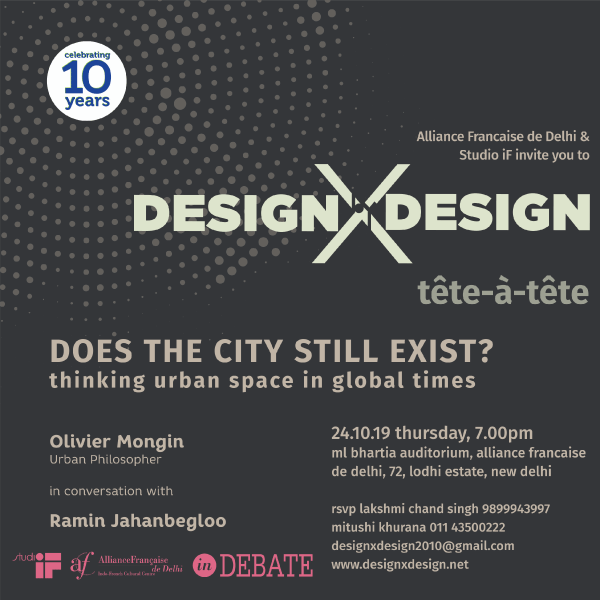Date/Time
Date(s) - 24/10/2019
7:00 pm - 8:30 pm
Location
M L Bhartia Auditorium, Alliance Francaise de Delhi
Categories

About Design X Design : Design in its many manifestations forms an integral part of every culture. Civilizations evolve and attain their full potential because of it. Design based creative communities in India are witness to a fascinating churning, necessitating a search for a vision that may inform their evolution beyond – spanning education, profession and the industry. Thus, involving exposes, roundtables, exhibitions etc. Design X Design is a step in that direction.
The energy behind the design of a pin or a city being the same, this joint initiative of Alliance Française de Delhi and Studio IF is also geared towards raising levels of appreciation within and nurturing connections across various creative communities- architecture, urban/ landscape/ interior design, product/ industrial design, textile/ fashion design, graphic/ communication design etc. Local and global in outlook, it is directed at the initiated and the uninitiated alike.
About DXD tête-à-tête : The DXD tête-à-tête involves a conversation-based exchange of ideas on a vital subject between a guest speaker and discussant/s. Conducted as and when possible, it may or may not be preceded by an organized presentation.
About the Speaker:
Olivier Mongin : Urban Philosopher
Philosopher, essayist and publisher, Olivier Mongin, former editor of the jour nal Esprit, has reflected for nearly 30 years on the process of progressive deterritorialization of cities, which escape regulations because of their integration into a vast global movement materialized by f lows. For Mongin, Metropolitan areas are faced with an alternative, either move towards fragmentation or towards an inclusive reconfiguration giving back a minimum of solidarity between territories included in the flows and territories taking refuge in the inner city. According to Mongin, urban values have focused all the thoughts of the city but also the action of the city because the city is not the domain of vita contemplativa but the domain of vita activa, and therefore of exchanges. Urban values draw on extremely diverse semantic and symbolic registers that are not heterogeneous and overlap more or less according to the situation: – the political register, which draws on Greek thought, Roman law and biblical texts – the register of the imaginary, which is a register of staging, of the image, which has become very important in the way the city is valued and evaluated; – the urban planning register is a recent register, specific to European history, which refers to architecture as well as to the uto-pie.
There is therefore no accomplished urban model but a luxuriance of reflection on urban values. In the age of globalization, the latter also draws on several historical traditions that we tend to ignore. To ask the question of the values of the city of tomorrow presupposes starting from the observation that there is a radical disjunction between Urbs and Civitas, between urbanization and urban values, i.e. urbanity. The real issue is therefore to take note of urban globalization and to consider whether it is possible to rebuild urban value. This also implies reflecting on the notion of “limits” since the European classical city, the fortified city of the Middle Ages, was a city that marked limits for integration, thus laying the foundations of the reputed city.
Today, the tendency is more to choose one or the other extreme. From now on, the city is sometimes thought of as illimited in the case of an octopus city like Sao Paulo or the cauldrons cities mentioned by Jean- Louis Borloo, sometimes as a contracted city, as an island city, which often serve as examples, such as Dubai or Singapore.
About the Discussant
Ramin Jahanbegloo is a political philosopher. He is presently the Executive Director of the Mahatma Gandhi Centre for Nonviolence and Peace Studies and the Vice-Dean of the School of Law at Jindal Global University- Delhi, India. He received his B.A. and M.A. in Philosophy, History and Political Science and later his Ph.D. in Philosophy from the Sorbonne University. In 1993 he taught at the Academy of Philosophy in Tehran. He has been a researcher at the French Institute for Iranian Studies and a fellow at the Center for Middle Eastern Studies at Harvard University.
Ramin Jahanbegloo taught in the Department of Political Science at the University of Toronto from 1997-2001. He later served as the head of the Department of Contemporary Studies of the Cultural Research Centre in Tehran and, in 2006-07, was Rajni Kothari Professor of Democracy at the Centre for the Study of Developing Societies in New Delhi, India. He was an Associated Professor of Political Science and a Research Fellow in the Centre for Ethics at University of Toronto from 2008-2012 and an Associate Professor of Political Science at York University in Toronto from 2012 – 2015. He is also a member of the advisor y board of PEN Canada. He is the w inner of the Peace Prize from the United Nations Association in Spain (2009) for his extensive academic works in promoting dialogue between cultures and his advocacy for non-violence and more recently the winner of the Josep Palau I Fabre International Essay Prize.
 Alliance Française de Delhi Learn French, Delf-Dalf Exam, Indo-French Cultural Events
Alliance Française de Delhi Learn French, Delf-Dalf Exam, Indo-French Cultural Events